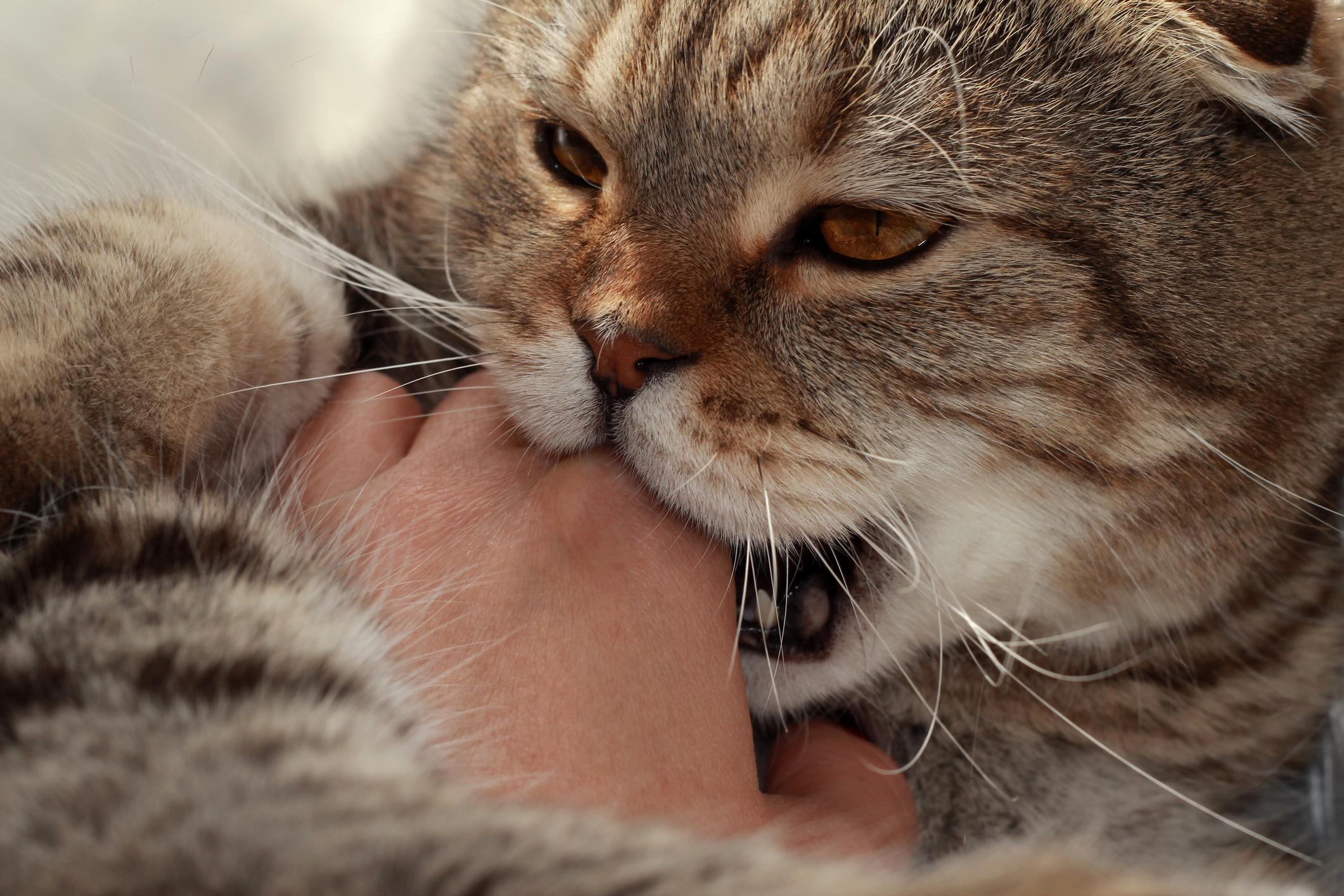My Cat Keeps Biting My Hand



See files for Cats
It is common for many of us to assume a cat biting a guardian is a sign of aggression. As with all feline communication, we need to look at the context of the situation to understand what they are trying to say with their actions. The reasons a cat bites our hand or any part of our body will depend on their wellbeing, the type of interaction, our own behavior and other factors.
With this idea of context in mind, AnimalWised tries to understand why my cat keeps biting my hand. We see what situations in which this behavior might occur and how our approach to their care might be influencing their biting.
Exploratory behavior
If your kitten keeps biting your hand, it is important to know this is completely normal behavior. When cats are born, their eyes are not even open yet. They need to navigate their world with their mouths, something they will do to a certain extent for their entire lives. This starts with their movement toward suckling on their mother's teats and will progress to exploring further afield.
Since feeding is the main occupation of newborn kittens, simply putting your finger near their mouth is likely to result in a bite. When they start to explore their world with their siblings, biting will also become an important part of expression. It is particularly important when playing as they will discover both how they can use their mouths to manipulate their environment and when they should hold back. The latter is known as bite inhibition.
As the kitten will bite their siblings to learn boundaries, the same will happen with their guardians. They will bite when playing and exercise their hunting instinct in a way that domesticated living can allow. Eventually, they should learn bite inhibition with us.
Unfortunately, some cats will not learn as well as others. In this case, it might happen that the cat keeps biting your hand. This is particularly common with cats that have been removed from their mother and siblings too early.
What to do if a cat bites to explore
The important thing with kittens is to leave them with their mother and siblings for a minimum of 8 weeks, but ideally up to 12 weeks. During this time the mother will care for them and complete the weaning period from milk to solid food. The kittens will learn lessons both from their mother and from their interactions with their siblings, lessons which will prove invaluable when living with their guardian.
Unfortunately, there are circumstances when this advice is too late and the kitten has already been removed prematurely from their mother. In the next sections, we look at what happens in these cases and what we can do about them.

Poor socialization
When the cat is removed prematurely, it means their socialization is greatly affected. They will not learn the behaviors and boundaries they would normally learn from their siblings. They will also have problems understanding various other stimuli in their environment, such as noises, machines, nature and even their human guardian.
Early socialization with other cats is key to help develop confidence and security. Without it, they can become very fearful of the stimuli in their environment and bite our hand as a result. Although the early part of socialization is very important, it is not the only factor. Even cats removed at the right time will need to learn how to interact with us and see that we do not pose a threat to their wellbeing.
Some kittens may know we don't pose a threat, but their lack of socialization means they haven't learned boundaries such as bite inhibition. This is particularly noticeable when we play with the cat and they may bite us quite hard without meaning to cause us any injury.
What to do if a cat is poorly socialized
If your cat has been poorly socialized, then it is up to their guardian to improve it. We will need to support them with positive reinforcement, but also establish boundaries which can help them to learn bite inhibition. This will be easier with kittens, but it can happen with older felines to a certain degree. Learn more with our guide to socializing an adult cat.
Poor education or training
It is common for people to ask why does my cat bite keep biting my hand while playing. Play behavior for cats is very important for exploration, but it is also a way cats can bond and simply have fun. Since we want to bond with our cat, we will need to play with them, but we also need to establish some rules.
When kittens play with their siblings, their siblings will show them when they have gone too far. We need to do the same, otherwise they will think it is OK to bite us even when they are adult cats which can do some serious damage. If we don't redirect this behavior, we will reinforce it.
Unfortunately, many guardians reinforce this behavior without meaning too. One of the most common reasons our cat keeps biting our hand is because we keep asking them to. By using our hands to play with our cat, we show the cat that we consider our hands to be a plaything, the same as any of their toys.
How to stop a cat biting when playing
Cats have a hunting instinct which is exercised during play and games. We can see it when they chase shadows on the wall, lunge at feathered toys or even when they attack our legs, seemingly out of nowhere. Suppressing this hunting instinct is not only bad for the cat, it is impossible. They need to find a way to exercise this instinct in a health way.
When we play with our cat using our hands, we confuse them into thinking they are just another toy. When we dangle a piece of string in front of them, we have no problem when they bite and catch it in their paws. Dangling our hands in front of them when they want to play means they see them in the same way.
If our cat is biting our hands and playing inappropriately, it is important we remove our hand and give them a more appropriate toy. This way, the cat can redirect the behavior to something they know is OK to scratch or bite. If they persist in attacking our hands, then we need to stop the play altogether. Provide positive reinforcement only when they resume appropriate behaviors. Over time, they should recognize our boundaries and stop biting our hands.

Stress or discomfort
If your cat bites your hands when you pet them, you may be touching them inappropriately. Cats have certain areas on their body they like to be petted, but also places they don't want you to touch them. Where exactly these places are will depend on the individual cat. For example, even if the cat exposes their belly to you, many cats will feel very vulnerable when you touch their stomach and bite you. A minority will be fine being touched here.
Before the cat bites your hand, it is likely they will have shown some signs of discomfort. These include:
- Flattening their ears to their head
- Purring rhythmically and uniformly
- Wagging their tail erratically or holding it between their legs
A similar situation can occur if the cat is stressed. Cats can be stressed for various reasons. Often the causes is related to a change in their routine or something threatening their security. This can be due to the presence of a new family member or even a change of address. If you see your cat keeps biting your hand when it is something they didn't do before, it is likely because something is causing disruption and threatening their security.
What to do if my cat is biting from stress
While we can use some of the practical guidelines detailed above to help the cat change their behavior, their behavioral problems won't go away until the underlying cause is addressed. In fact, if we do not address the issue, it can lead to serious problems in their mental wellbeing as well as their physical health.
Finding out the root cause of stress is not always easy, but the first thing we need to do is to take them to a veterinarian. This is because some cats may feel anxiety due to a physical health issue. They may be confused because they are in pain and our biting our hand as a way to express this anxiety. Only a qualified veterinarian will be able to determine the cause through proper examination.
If this is not the case, we will need to look at their situation and determine what might be causing the stress. Some obvious stressors may include the introduction of a new cat or even moving home. We can support them and provide reassurance, but we may need to speak to an ethologist. They can best determine the cause of the cat's stress and introduce practical means of addressing the issues.
Aggression due to trauma
We may consider a cat's early removal from their mother and siblings as a cause of trauma. However, there are many experiences which can lead to a cat developing behavioral problems such as biting your hand. Neglect and abuse are some of the most common reasons we find cats in shelter systems, along with abandonment. These past experiences will shape the cat's personality in many ways, with aggression being unfortunately common.
Physical trauma can also lead to a cat's aggression. Similar to experiencing a pathological disease or other medical issue, when a cat is in an accident, fight or experiences any traumatic incident, they may bite our hand because we touch somewhere painful. Since cats are very good at hiding their pain, we may not be aware of an incident until we touch them and they bite our hands as a reaction.
What to do if our cat experiences trauma
Whether our cat has experienced emotional or physical trauma, we will know by their behaviors. Often cats adopted from shelters or rescued from the street will have experienced some type of trauma, even in the form of neglect. Often the workers at a shelter will explain this situation and let us know how the cat needs to be treated. In these cases, the cat may require someone who is sufficiently experienced to meet their specific emotional needs.
For physical trauma, it is vital you take the cat to a veterinarian. They will be able to examine the cat and determine the cause of the pain, as well as establish the correct course of treatment. Once treated, hopefully the cat will stop biting your hand.
For more specific information on what to do with rescue cats, see our article on what to do if you find an abandoned cat.

If you want to read similar articles to My Cat Keeps Biting My Hand, we recommend you visit our Behavioral problems category.






